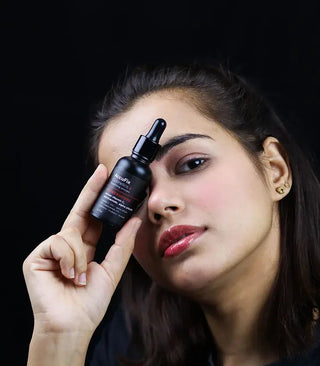Introduction
Harnessing the power of skin-enhancing ingredients can feel a bit like mastering chemistry. With all the different ingredients and their varied forms, things can quickly get confusing. So today, we’re going to explore the dynamic duo of skincare—niacinamide and vitamin C—and answer a much-debated question about the two: “Can I use niacinamide with vitamin C?”

Benefits of Vitamin C for Skin
Vitamin C, or L-ascorbic acid, is a highly potent antioxidant that shields skin from environmental aggressors like pollution and UV damage. It also boosts your skin's defence mechanism, making it an excellent ingredient to prevent skin damage.
Vitamin C also plays a crucial role in collagen synthesis, and collagen, as we’re all aware, is essential for maintaining skin firmness and elasticity. Vitamin C also reduces hyperpigmentation by inhibiting the enzyme tyrosinase, which is responsible for melanin production. This makes it a popular choice for brightening skin tone and reducing the appearance of dark spots.

An Overview of the Different Forms of Vitamin C Used in Skincare
L-Ascorbic Acid (LAA) is the purest form of Vitamin C and is incredibly effective but is extremely unstable and prone to degradation - if you’ve ever had an ascorbic acid serum that’s turned brown before you were able to finish the bottle, you’ve witnessed how unstable ascorbic acid is first hand. Ascorbic acid also works best at a very low pH, which can cause skin irritation.
Derivatives like Magnesium Ascorbyl Phosphate (MAP), Sodium Ascorbyl Phosphate (SAP), and Ascorbyl Tetraisopalmitate are more stable and gentle, albeit less potent than ascorbic acid. They also work at a higher pH level and are therefore more compatible with a wider array of skincare products.
Benefits of Niacinamide for Skin
Niacinamide, or Vitamin B3, on the other hand, is another well-loved skincare ingredient known for its versatility. It aids in reducing enlarged pores, uneven skin tone, and fine lines. It also strengthens the skin's barrier function by boosting ceramide production, improving skin hydration, and texture6.
Niacinamide has also been found to have anti-inflammatory properties that make it a great choice for soothing skin conditions like acne and rosacea.

Can I Use Niacinamide with Vitamin C?
Contrary to popular belief, using niacinamide and vitamin C together does not neutralise their effectiveness or create problematic substances that might redden the skin. This misconception stems from outdated studies dating back to the early 1960s, which used non-stabilized forms of the ingredients, unlike the stabilised versions typically used in modern-day cosmetic formulas. It's also important to note that the byproduct of niacinamide and vitamin C, nicotinic acid, is only produced in high-temperature environments, a situation unlikely in regular at-home usage. What’s more? This concern only applies to pure vitamin C (ascorbic or l-ascorbic acid), and not to other popularly used forms in skin care such as sodium ascorbyl phosphate, tetrahexyldecyl ascorbate, and ascorbyl glucoside.
Combining niacinamide and vitamin C in your skincare regimen can lead to numerous benefits. Niacinamide alone is known for its skin-restoring properties, improving the appearance of enlarged pores, fine lines, and dull skin. Vitamin C, on the other hand, is a potent antioxidant that helps defend the skin from environmental stressors and can also diminish dullness and visible signs of ageing. The combination of these two ingredients addresses issues like uneven skin tone, wrinkles, loss of firmness, and dullness, leading to a progressively more radiant, smooth, even, and noticeably younger-looking complexion.
How to Use Vitamin C and Niacinamide Together
To leverage the benefits of both niacinamide and Vitamin C, you can incorporate them into your daily skincare routine. Here’s an easy sample skincare routine that anyone looking to incorporate both ingredients into their skincare routine can adopt.
In the morning, wash your face with the Hydrating Gentle Daily Cleanser. Apply Vitamin C Serum while your skin is still damp and follow up with Crème B3-B5-E, which is formulated with 4% niacinamide, to moisturise. Finish with The Ultimate Sunscreen.
Follow the same routine at night, but skip the sunscreen.
Keep in mind, everyone's skin is different, and reactions can vary. Always conduct a patch test when introducing new products and consult with a dermatologist if you have specific skin concerns.
The journey to healthier skin is all about understanding the right ingredients and how to use them effectively. With the proper knowledge and application, the combination of niacinamide and vitamin C is a fantastic one to unlock your skin's potential.
As always, if you need any further help, feel free to WhatsApp us for a free skincare consultation: 0302-2228349.

